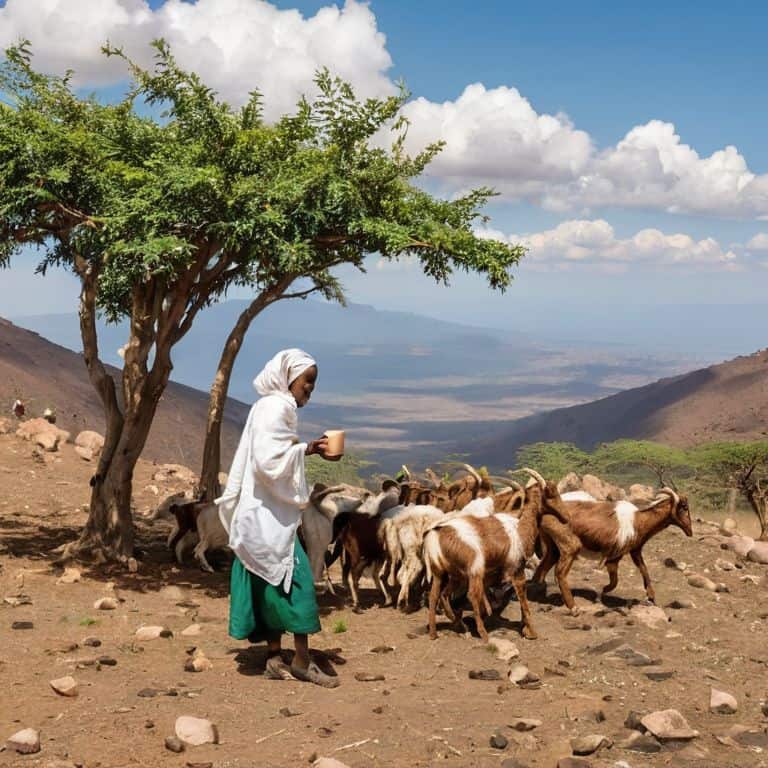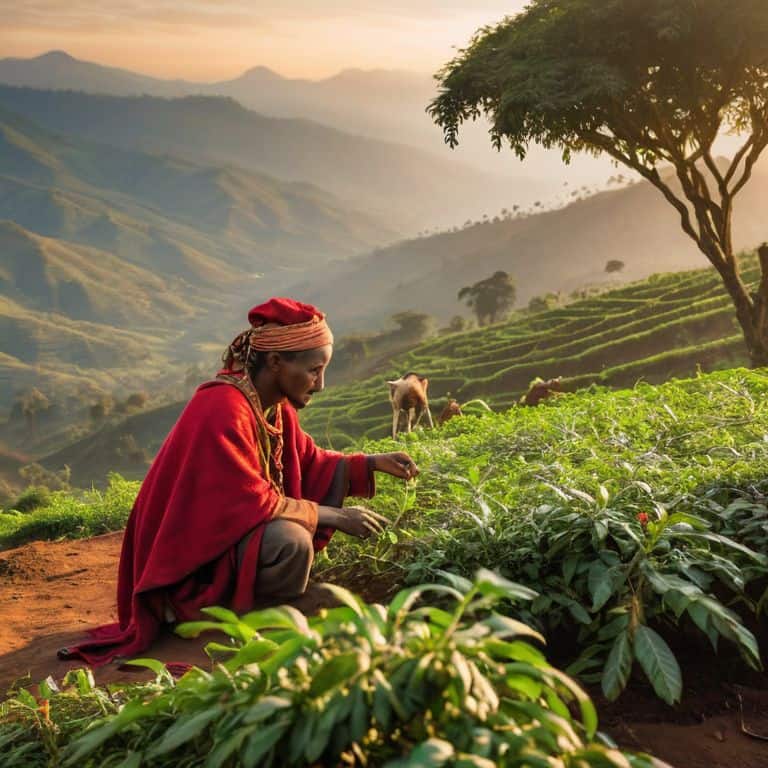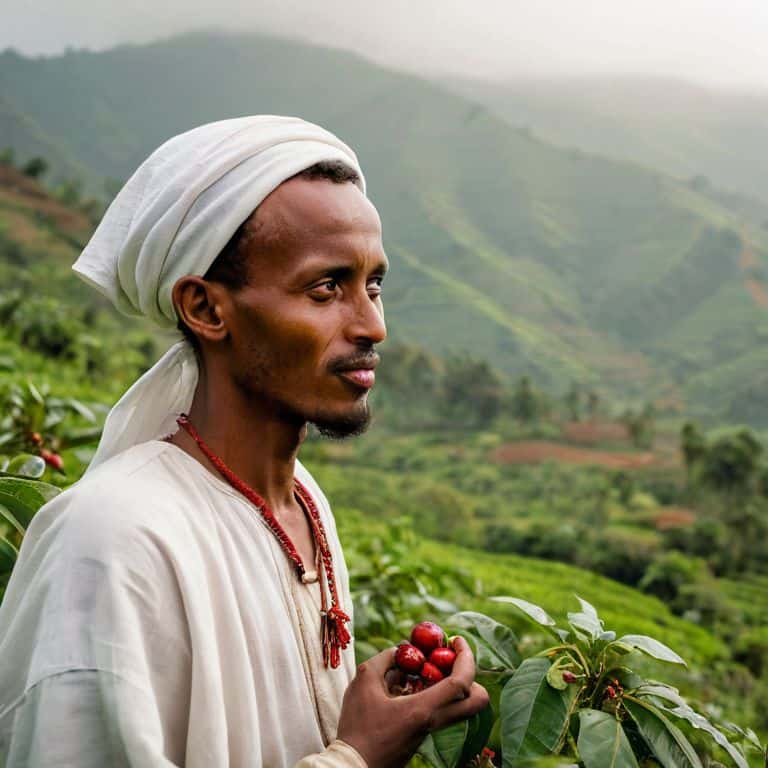As I sit in my favorite historic café, surrounded by the aroma of freshly brewed coffee, I am reminded of the legend of Kaldi the Ethiopian goatherd. It’s a story that has been told and retold, but often in a way that feels overly romanticized. I’ve always been fascinated by the way this legend has been used to sell coffee, with many companies claiming that their beans are somehow connected to Kaldi’s discovery. But what really happened, and how did this legend become so deeply ingrained in our coffee culture?
As a food historian, I’ve spent years uncovering the truth behind the stories we tell about food and drink. In this article, I promise to take you on a journey to unravel the myth of Kaldi, to explore the cultural significance of coffee in Ethiopia, and to examine how this legend has evolved over time. I’ll share my own experiences, from urban sketching in Ethiopian cafes to reading poetry about coffee, to provide a unique perspective on this fascinating topic. By the end of this article, you’ll have a deeper understanding of the legend of Kaldi the Ethiopian goatherd and its enduring impact on our coffee culture.
Table of Contents
Kaldis Ancient Coffee Secrets

As I delve into the ethiopian coffee history, I am reminded of the fascinating story of Kaldi and his discoveries. It’s said that Kaldi noticed his goats becoming more energetic after eating the red berries of a certain plant. This observation led to the uncovering of the coffee plant, a find that would change the course of human history. The story of Kaldi and his goats is deeply rooted in ancient coffee traditions, and it’s a testament to the power of curiosity and observation.
The legend of coffee discovery is filled with intriguing stories and myths, but Kaldi’s tale remains one of the most captivating. It’s believed that Kaldi experimented with the coffee beans, trying to understand their effects on his goats. This experimentation ultimately led to the discovery of coffee as a beverage, and the rest, as they say, is history. As I sit in a quaint café, surrounded by the aroma of freshly brewed coffee, I am reminded of the significance of coffee folklore and myths in shaping our understanding of this beloved drink.
In the stillness of the morning, as I sip my coffee, I am transported to the rolling hills of Ethiopia, where Kaldi’s journey began. The story of Kaldi and his goats is a reminder that even the most ordinary moments can lead to extraordinary discoveries. As I reflect on the goats and coffee beans, I am struck by the simplicity and beauty of this ancient tale, and the profound impact it has had on our lives.
Goats and the Coffee Bean Discovery
As I sit in this quaint, historic cafe, surrounded by the aroma of freshly brewed coffee, I am reminded of the fascinating story of Kaldi’s discovery. It’s said that his goats, upon eating the bright red berries, began to dance and prance with unusual energy. This peculiar sight caught Kaldi’s attention, and he decided to try the berries himself, thus uncovering the stimulating effects of coffee.
The image of those goats, full of vitality, is forever etched in my mind, and I often wonder about the serendipitous moment when Kaldi first witnessed their antics. It’s amazing to think that this chance encounter would lead to the discovery of coffee, a beverage that has become an integral part of our daily lives, bringing people together and fueling conversations for centuries.
Unveiling Ethiopian Coffee History
As I delve into the rich history of Ethiopian coffee, I am reminded of the ancient traditions that have been passed down through generations. The country’s highlands, with their lush green landscapes and vibrant culture, are the perfect setting for coffee production. From the delicate process of hand-picking coffee cherries to the intricate rituals of traditional coffee ceremonies, every aspect of Ethiopian coffee is steeped in history and tradition.
In the heart of Ethiopia’s coffee culture lies the traditional coffee ceremony, a ritual that brings people together and fosters a sense of community. This ceremony, which involves the roasting of green coffee beans, the grinding of the beans, and the brewing of the coffee in a clay pot called a jebena, is an integral part of Ethiopian social life.
The Legend of Kaldi Unfolds

As I sit in this quaint, historic café, surrounded by the whispers of the past, I am reminded of the ancient coffee traditions that have been woven into the fabric of our lives. The story of Kaldi, the Ethiopian goatherd, is one that has been passed down through generations, a testament to the power of coffee to bring people together. It’s said that Kaldi’s curiosity and observation of his goats’ unusual behavior after eating the red berries of the coffee plant led to the discovery of coffee’s stimulating effects.
The legend of coffee discovery is a fascinating tale that has captivated the hearts of many, and as a food historian, I am drawn to the rich Ethiopian coffee history that underlies this story. From the lush highlands of Ethiopia to the bustling coffeehouses of Europe, the journey of coffee is a long and winding one, filled with twists and turns that have shaped the course of human history. As I delve deeper into the world of coffee, I am struck by the significance of goats and coffee beans in this narrative, a reminder that even the most unlikely events can have a profound impact on our lives.
In the stillness of the morning, as the sun rises over the rolling hills, I imagine Kaldi tending to his goats, unaware of the coffee folklore and myths that would soon surround him. The discovery of coffee is a story that has been retold and reinterpreted over time, yet its essence remains the same – a testament to the human spirit’s capacity for curiosity, innovation, and connection. As I sip my coffee, I am grateful for the opportunity to explore the captivating world of coffee, where legend and history blend together in a rich tapestry of flavors and stories.
Coffee Folklore in Ancient Traditions
As I sit in this quaint, historic café, surrounded by the whispers of the past, I am reminded of the rich cultural heritage that coffee embodies. The stories of Kaldi and his goats are woven into the fabric of Ethiopian folklore, where coffee is not just a beverage, but a symbol of community and tradition.
In the ancient traditions of Ethiopia, coffee ceremonies are an integral part of social gatherings, where the aroma of roasted beans and the sound of laughter fill the air, creating a sense of warmth and belonging.
Kaldi and the Coffee Plant Myth
As I delve into the story of Kaldi, I find myself entranced by the whispers of the past, where myth and reality blur. The coffee plant, with its vibrant green leaves and crimson berries, is said to have been the catalyst for Kaldi’s discovery. It’s fascinating to think that this plant, which has become an integral part of our daily lives, was once a mysterious and enchanting entity.
The legend of Kaldi is deeply intertwined with the coffee plant myth, which has been passed down through generations. I imagine Kaldi, a curious and adventurous goatherd, stumbling upon the coffee plant and being drawn to its unusual beauty and fragrance. As he watched his goats frolic and dance after eating the coffee beans, he must have felt a sense of wonder and awe, unaware that he was on the cusp of uncovering a secret that would change the world.
Unveiling the Essence of Kaldi's Discovery: 5 Timeless Tips
- I still recall the day I stumbled upon an ancient manuscript that revealed Kaldi’s goats were not just any ordinary goats, but rather the catalysts for a coffee revolution that would spread across the globe
- As I sat in a quaint Ethiopian cafe, sipping on a traditional cup of coffee, I realized that the true magic of Kaldi’s discovery lies not just in the coffee beans, but in the stories and traditions that have been passed down through generations
- To truly appreciate the legend of Kaldi, one must immerse themselves in the rich cultural heritage of Ethiopia, where the rhythms of traditional music and the aromas of freshly roasted coffee beans fill the air
- I’ve had the privilege of traveling to the rolling hills of Ethiopia, where I met with local farmers who still use ancient techniques to cultivate and harvest coffee, and I was struck by the deep connection they have with the land and the coffee plants
- As a food historian, I’ve learned that the key to understanding the legend of Kaldi is to delve into the folklore and mythology that surrounds him, and to explore the ways in which his discovery has shaped the course of human history, one cup of coffee at a time
Three Essential Lessons from the Legend of Kaldi
I’ve discovered that the story of Kaldi, the Ethiopian goatherd, is more than just a myth – it represents the serendipitous discovery of coffee and its subsequent impact on human culture and tradition
The history of coffee is inextricably linked with the traditions and folklore of ancient Ethiopia, where the coffee plant was first cultivated and revered for its stimulating effects
Through Kaldi’s legend, we find a powerful symbol of the role coffee has played in fostering community, creativity, and conversation throughout history – a reminder to slow down and appreciate the rich stories behind our daily cup
Unpacking the Enchantment
The legend of Kaldi, the Ethiopian goatherd, whispers to us of the mystical marriage between nature and human curiosity, reminding us that the simplest discoveries can brew the most profound transformations.
Isabella Marino
Reflecting on the Timeless Tale of Kaldi

As I sit in this quaint, historic cafe, surrounded by the aroma of freshly brewed coffee, I am reminded of the fascinating story of Kaldi, the Ethiopian goatherd who stumbled upon the magical beans. From the unveiling of Ethiopian coffee history to the discovery of the coffee bean, Kaldi’s legend has been a journey of wonder and curiosity. The ancient coffee secrets he uncovered have been passed down through generations, and his story continues to inspire us to appreciate the rich culture and tradition behind our daily cup of coffee. Whether it’s the coffee folklore in ancient traditions or the legend of Kaldi itself, there’s no denying the significant impact this humble goatherd has had on our understanding and appreciation of coffee.
As I finish writing this tale, I am left with a sense of awe and gratitude for the simple pleasures in life, like a good cup of coffee and a compelling story. The story of Kaldi serves as a reminder that even the most seemingly ordinary moments can lead to extraordinary discoveries, and that the human connection we make over a cup of coffee can be a powerful catalyst for community and inspiration. So, the next time you sip your coffee, remember Kaldi, the curious goatherd who unleashed the magic of coffee upon the world, and let his story inspire you to slow down, appreciate the moment, and savor the flavor of this ancient, beloved beverage.
Frequently Asked Questions
What was the exact region in Ethiopia where Kaldi is said to have discovered coffee?
The exact region where Kaldi stumbled upon coffee is said to be the Kaffa zone, in the southwestern highlands of Ethiopia. I recall pouring over ancient maps in a quaint Vienna café, tracing the contours of this enchanting land, where the lush forests and rolling hills whispered secrets of the past.
How did the legend of Kaldi spread beyond Ethiopia to influence coffee cultures in other parts of the world?
As I sit in this quaint, centuries-old café, I ponder how Kaldi’s legend traversed the globe. It’s said that Arabian traders, enchanted by the tale, carried it along the ancient trade routes, weaving a rich tapestry of coffee folklore that would forever change the cultural landscape of the Middle East, Europe, and beyond.
Are there any modern-day coffee farms or traditions in Ethiopia that still honor the legacy of Kaldi and his discovery?
In Ethiopia’s highlands, I’ve had the privilege of visiting traditional coffee farms that still pay homage to Kaldi’s discovery. The Guji region, for instance, is home to small-scale farmers who cultivate heirloom varieties using ancient techniques, keeping Kaldi’s legacy alive in every carefully hand-picked coffee cherry.



